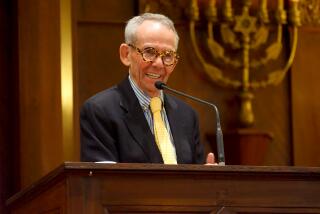Wave Your Nose in the Air and Just Don’t Give a Care
- Share via
I’m a snob, yes. And while I’m on the subject, I’ll admit to also being an anti-snob, which is an especially annoying kind of snob. You see, I’m feeling at ease with the whole subject of snobbery just now.
Ordinarily, this is a touchy matter. Which is to say, we avoid touching it except on those occasions when we intend to deliver an insult with the barb exposed. Such as: Did I hear her say she liked that painting because it matched her carpet? Or, most of the guys in San Quentin could call themselves self-made men too.
These aren’t the kinds of things you want to be overheard saying about someone, no matter how achingly true, if you expect to be invited over for foie gras and a swim in the pool again. Such aspersions are themselves snobbery, of course. As Virginia Woolf said, “The essence of snobbery is that you wish to impress other people.” Usually at the expense of someone else.
I know these things because I just read Joseph Epstein’s witty, cathartic book, “Snobbery: The American Version.”
Epstein is a snob and an anti-snob and, as far as I know, our reigning theoretician on snobbery. Otherwise, he is a lecturer on English and a bang-up writer from the snob capital of the heartland, Chicago.
By the trick of taking a gander at our culture through the peephole of a single idea, Epstein comes tantalizingly close to achieving a unified force field theory that explains practically everything that makes us tick, whether it be the smugness of our political conversations, the contemporary triumph of victimhood, the annoying proliferation of name-droppers, the reason that our 5-year-old raincoat no longer feels comfortable even though it fits perfectly or the sudden appearance in some places of more varieties of virgin olive oils “than actual virgins.”
I may have to read the book again to make sure, but I also think he suggests a possible rationale as to why people purchase automobiles capable of exceeding the speed limit three times over, or why the middleman evokes career envy even though he “creates little, builds less, changes lots, but develops nothing enduring.” I haven’t felt this sunny all summer.
True, as Epstein writes, “every act of snobbery is at bottom an act of weakness.” But I say that if life’s irritations--our cultural discordance, even those mysterious impulses we feel--can be decoded as so much snobbery in action instead of something far darker, then perhaps the proper response is not despair but a good laugh on ourselves.
Understanding what separates us provides “a halfway common language,” as novelist Harold Brodkey put it. Which is a start. Besides, snobbery is one of those universal sins that almost always shrinks when exposed to daylight. It is, I think, a form of social profiling that gets us no further than the profiling used by police. To wit: There may be something behind it, but it ends up saying at least as much about the profiler as the profiled.
For example, Epstein is particularly harsh on the politics of “virtuecrats,” as he calls them--the self-defining aristocracy of pontificators who believe their “political views are not merely correct but deeply, morally righteous in the bargain.”
Given my line of work, there was a time when I might have taken criticism like that personally. Particularly when he libels virtuecrats as left-leaning prigs. But it came to me that only a snob of the first order would be glib enough to denigrate morality as a foundation for politics, let alone relinquish the bulk of it to leftists. A better belief system would be, what, Darwinian self-interest?
So I found myself smiling instead. When two snobs cannot make eye contact for having their noses in the air, you have a setup for slapstick. At least that’s the lesson I tucked away after meditating on this subject of snobbery. It’s pervasive, yes. But not always our awareness of it. Not in others and not in ourselves.
Epstein deserves a tip of the hat. There is plenty to divide us these days. It’s a relief to realize that some of it, no matter how earnestly it’s expressed, is only the silliest of things.
“Snobbery,” observed Proust (a favorite must-read for today’s literary snobs), “is a grave disease, but it is localized and so does not utterly corrupt the soul.”
More to Read
Sign up for our Book Club newsletter
Get the latest news, events and more from the Los Angeles Times Book Club, and help us get L.A. reading and talking.
You may occasionally receive promotional content from the Los Angeles Times.







